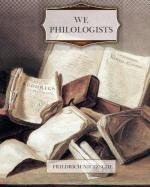38
Our terminology already shows how prone we are to judge the ancients wrongly: the exaggerated sense of literature, for example, or, as Wolf, when speaking of the “inner history of ancient erudition,” calls it, “the history of learned enlightenment.”
39
According to Goethe, the ancients are “the despair of the emulator.” Voltaire said. “If the admirers of Homer were honest, they would acknowledge the boredom which their favourite often causes them.”
40
The position we have taken up towards classical antiquity is at bottom the profound cause of the sterility of modern culture; for we have taken all this modern conception of culture from the Hellenised Romans. We must distinguish within the domain of antiquity itself: when we come to appreciate its purely productive period, we condemn at the same time the entire Romano-Alexandrian culture. But at the same time also we condemn our own attitude towards antiquity, and likewise our philology.
41
There has been an age-long battle between the Germans and antiquity, i.e., a battle against the old culture. It is certain that precisely what is best and deepest in the German resists it. The main point, however, is that such resistance is only justifiable in the case of the Romanised culture; for this culture, even at that time, was a falling-off from something more profound and noble. It is this latter that the Germans are wrong in resisting.
42
Everything classic was thoroughly cultivated by Charles the Great, whilst he combated everything heathen with the severest possible measures of coercion. Ancient mythology was developed, but German mythology was treated as a crime. The feeling underlying all this, in my opinion, was that Christianity had already overcome the old religion . people no longer feared it, but availed themselves of the culture that rested upon it. But the old German gods were feared.
A great superficiality in the conception of antiquity—little else than an appreciation of its formal accomplishments and its knowledge—must thereby have been brought about. We must find out the forces that stood in the way of increasing our insight into antiquity. First of all, the culture of antiquity is utilised as an incitement towards the acceptance of Christianity . it became, as it were, the premium for conversion, the gilt with which the poisonous pill was coated before being swallowed. Secondly, the help of ancient culture was found to be necessary as a weapon for the intellectual protection of Christianity. Even the Reformation could not dispense with classical studies for this purpose.
The Renaissance, on the other hand, now begins, with a clearer sense of classical studies, which, however, are likewise looked upon from an anti-Christian standpoint: the Renaissance shows an awakening of honesty in the south, like the Reformation in the north. They could not but clash; for a sincere leaning towards antiquity renders one unchristian.




